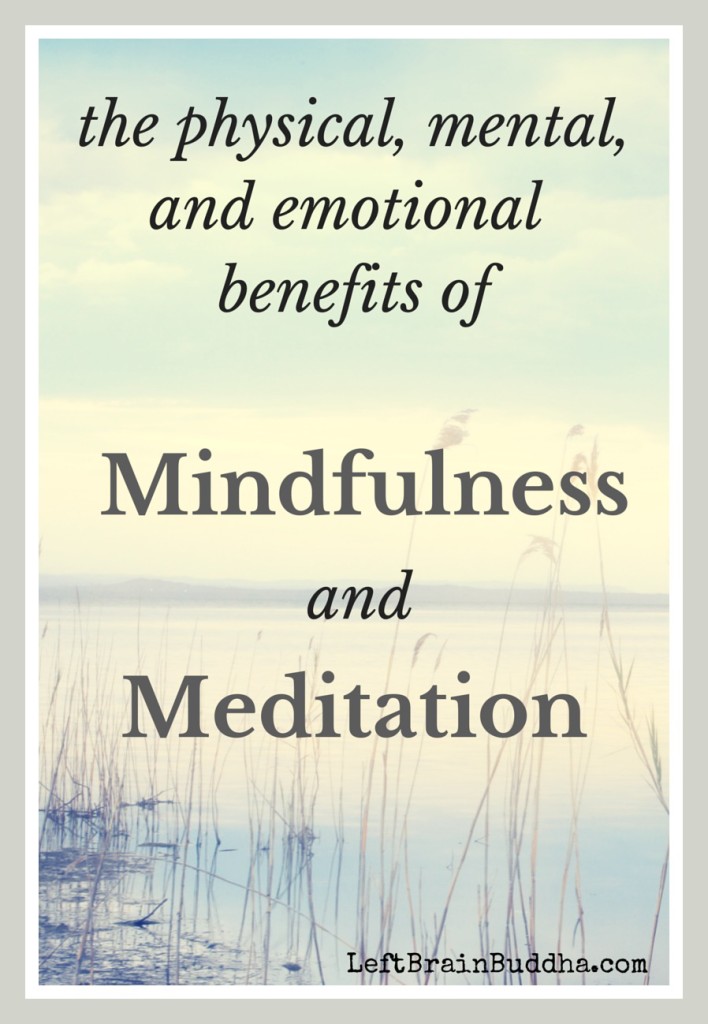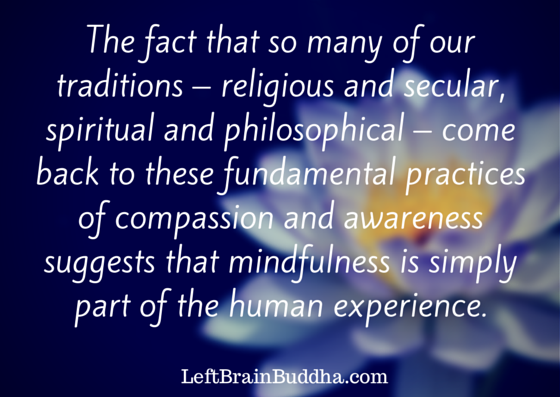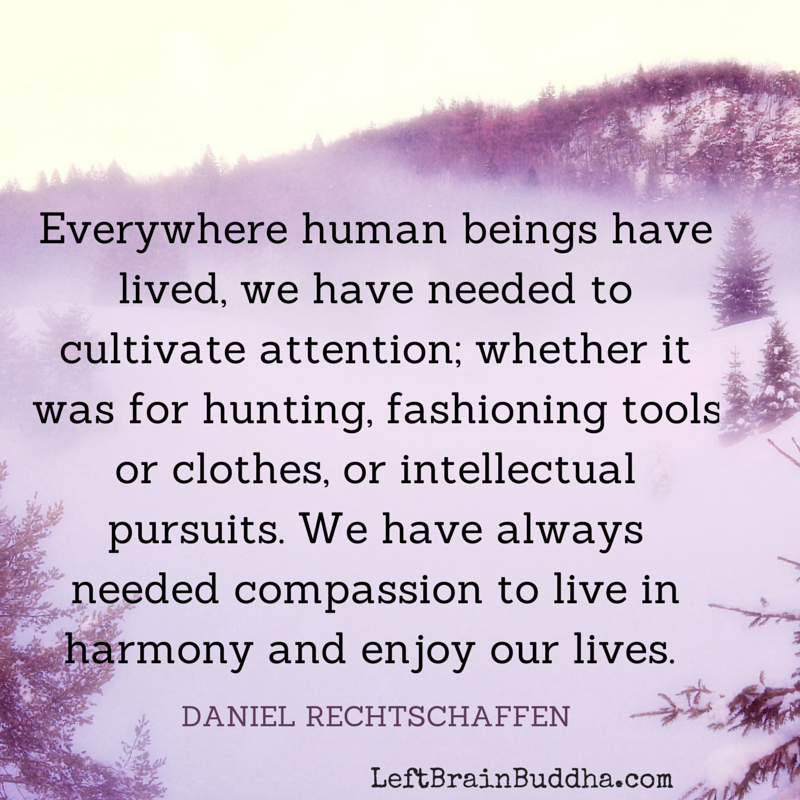Saturday 15 November 2014
Mindful Living Everyday
An orientation to practicing in the tradition of Thich Nhat Hanh.
Produced by David Nelson
Labels:
Mindfulness
Monday 10 November 2014
The Benefits of Mindfulness
by Sarah Rudell Beach
I know it has changed my life. And that’s why I want to share it with all of you.
Source: http://leftbrainbuddha.com/living-a-mindful-life-why-practice-mindfulness/
The modern mindful life, according to my new tagline, is informed by research and grounded in practice. It is absolutely astounding how much research has been conducted in the last decade on mindfulness and meditation and all the amazing ways it can transform our brains, and our lives.
Much of the research on mindfulness and meditation reveals the amazing neuroplasticity
of our brains — while we used to think that our brains stopped
developing in our early twenties, we now know that our experiences can
shape our neural development well into our sixties and beyond. The more
we exercise a particular neural pathway in the brain, the more we
strengthen it. In the cute phrase neuroscientists use, “Neurons that fire together, wire together.”
For example, a study of London cab
drivers revealed that they had larger-than-average hippocampuses
(hippocampi?). The hippocampus plays an important role in memory — and
the researchers concluded that all of the spatial memories the cabbies
created while driving through one of the world’s largest cities actually
increased the area in their brains devoted to making new memories.
Recent studies indicate that as little as 12 minutes of meditation a day,
over an 8-week period, is enough to create changes in the brain! Read
on for a summary of some of the most amazing findings in meditation
research:
Physical Benefits
- Meditation practice has been demonstrated to increase immune function – in one study, people who meditated produced more antibodies to the flu vaccine than people who didn’t meditate (which makes me excited because I just got a flu shot yesterday!)
- Meditation is also linked to an increase in telomerase (at the end of our genes), which can possibly reduce cell damage in the body.
- Mindfulness, including eating mindfully, has been linked to weight loss.
- In one study, participants who practiced meditation lowered their blood pressure and cut their heart attack risk in half over five years.
- Meditation reduces levels of the hormone cortisol (which raises blood pressure and levels of stress).
- Taking a few deep breaths engages our parasympathetic nervous system (our “rest and digest” mode), and deactivates our sympathetic nervous system (our “fight, flight, or freeze” mode).
Mental Benefits
- Meditation increases neural connections in the brain, and has been show to strengthen myelin (the protective sheath on our neurons that facilitates signaling in the brain).
- Meditation is linked to having a longer attention span and improves concentration.
- Meditation increases activity in the prefrontal cortex (associated with planning and judgment) and in the anterior cingulate (associated with emotional regulation, learning, and memory).
- In one study, participants who meditated for 30 minutes a day for 8 weeks had an increase in gray matter in the regions of the brain associated with memory, sense of self, and empathy.
- Students who meditated prior to an exam performed better than students who did not. The researchers linked meditation to improved cognitive functioning.
Emotional Benefits
- Mindfulness and meditation practices have been extensively linked to easing symptoms of depression and anxiety, and these techniques are used in many therapy settings.
- A 2007 study of students who had been taught meditation techniques revealed a decrease in test anxiety, nervousness, and self-doubt, and an increase in focus and concentration. Further studies have shown reduced absenteeism and suspensions in schools where mindfulness programs have been implemented.
- Mindfulness and meditation help us learn to turn off the negative self-talk or rumination that our minds often resort to when left on their own.
- Meditation reduces our emotional reactivity. One study found that mindful stress reduction practices actually decreased the size of people’s amygdala (responsible for our aggression, anxiety, and fear — an overactive amygdala is associated with depression).
- These practices can make us more compassionate. People who meditate show more activation in the area of the brain associated with empathy when they are exposed to someone who is suffering.
The Anecdotal Evidence
This information is impressive, but is
also very clinical. I want to end with some personal stories about the
benefits of mindfulness and meditation.
I love this post from Michelle Noehren of CTWorkingMoms, What I Know About Motherhood Now That I Practice Meditation.
Michelle writes, “I’ve experienced a dramatic drop in my anxiety level
and I feel like I’ve healed some relationships in my life that were
difficult, not because the other person changed anything, but because I
now fully understand that I have the ability to change situations solely
based upon the way I think.”
I have shared with you my experiences with postpartum depression and anxiety.
In addition to seeking professional help, I have greatly benefited from
practicing mindfulness and meditation. I am a lot calmer than I used to
be in dealing with my children, often responding now with compassion and a hug, rather than reacting with anger. Practicing mindfulness has indeed made me a better parent.
It has also helped me in overcoming my depression. The first time I read about rumination
{the negative self-talk often associated with depression} I was shocked
to see it listed as a symptom of depression. I thought everyone did
that! If we had a bad morning getting ready for school, my 20-minute
drive to work was filled with thoughts of what a terrible mother I was,
worrying my life would never feel normal again with these two little
children to take care of, and anticipating the continuation of the drama
when picking them up after work and then starting over with mama-stress
and dinner-time battles…. By the time I got to work I was emotionally
exhausted, and found little joy in being a teacher or a mother.
Mindfulness and meditation have made me so much more aware of my thoughts, and how I can stop my mind from dwelling on the negative. I now realize my thoughts are just the stories I tell myself about my life, they are not my life itself.
The emotions come and go, and I don’t need to waste my energy indulging
anger, worry, or frustration. Mindfulness allows me to find the
skillful response instead of jumping to an emotional reaction. I pay attention to the present moment and become aware of the good that’s always there, waiting to be seen.
As I have begun sharing this practice
with colleagues, teachers, and students, many people have thanked me for
teaching mindfulness. A common theme has emerged in all of the stories I
hear from people who have discovered these techniques — almost always,
they will say, “Mindfulness changed my life.”
Source: http://leftbrainbuddha.com/living-a-mindful-life-why-practice-mindfulness/
Labels:
Mindfulness
On Mindfulness
by Sarah Rudell Beach
Mindfulness is truly having its moment right now. It’s the Year of Mindful Living, the age of the Mindful Revolution.
Mindfulness is branching out from clinical and therapeutic settings and
entering classrooms and boardrooms, congressional offices, and military
bases. Each day, scientific research confirms the physical, cognitive, and emotional benefits of a mindfulness practice.
The more ubiquitous mindfulness becomes,
the more people begin to ask questions about it. And let me just say
for the record, I think both of those are good things. I truly believe
mindfulness has the power to transform our lives and our world. And I
absolutely believe that questioning is a good thing — knowledge is
power! Don’t jump on the bandwagon of a trend just because it’s on the
cover of Time magazine and Kobe Bryant does it. As Immanuel Kant implored us to do centuries ago, “Dare to know!”
One of the most common questions raised about mindfulness is this:
Is mindfulness a religion?
Short Answer
No.
Long Answer
No.
{Just kidding. I’ll give you the long answer…}
Mindfulness can be defined in many ways — the definition I like is simple: compassionate and intentional awareness. Mindfulness is the practice of paying attention – to thoughts, physical sensations, and the environment — without constantly feeling the need to judge what’s happening or to make it other than it is. To cultivate this present moment awareness, we pay attention on purpose, with an attitude of kindness to ourselves and others.
Words like “meditation” and even
“mindfulness” may make us think of berobed hippies or esoteric practices
conducted in the mountaintops of Tibet, but mindfulness can be as
simple as taking a few deep breaths before an important meeting, or
bringing our full awareness to a moment spent with our
children. Cultivating this compassionate and purposeful awareness allows
us to be present for the important people in our lives, as our kind
attention is the most loving gift we can offer.
Mindfulness is a way of being in the world. It is being present and available. It is a fundamental human capacity.
You’ve probably experienced it before, whether you’ve labeled it as
such or not. Think of a time when you were so engaged in an activity —
creating a work of art, playing a sport, reading a good book — that your
entire being focused on that one activity. That heightened state of
attention is mindfulness.
In my training with Mindful Schools in July, program director Megan Cowan described mindfulness as “a human ability, that, when it is lacking, makes life more unbearable.” Mindfulness is a way of meeting our experience with the presence of mind to respond skillfully to life’s challenges, rather than reacting based on intense emotions.
Mindfulness teaches us an awareness of the habits of our minds
and allows us to catch ourselves in negative patterns of rumination. We
may see that a good deal of our suffering comes from the stories we tell ourselves about the events in our lives, rather than from the events themselves. This human practice of compassionate and intentional awareness requires no dogmatic or spiritual beliefs.
But doesn’t mindfulness have religious origins?
Mindfulness has its origins in
contemplative practices that go back thousands of years, including
Buddhism, Hinduism, Taoism, and Stoicism. Some of these are religious
traditions, and some are not.
Virtually every spiritual tradition has practices for mindful contemplation and silence, and direct awareness of experience,
such as Catholic centering prayer, Buddhist meditation, the Jewish
Shabbat, or Sufi mysticism. Many secular philosophies incorporate these
teachings as well. The Roman Stoic philosophers Seneca, Epictetus, and
Marcus Aurelius advocated an approach to life that today we might label
as mindfulness; Aurelius wrote, “Our perturbations come only from the opinion which is within.”
And when it comes to compassion, well, there’s a reason they call it The Golden Rule. No tradition has a monopoly on empathy and love and kindness. Educator Daniel Rechtschaffen sums
it up this way: “Mindfulness does not belong to Christianity, Buddhism,
or Taoism, just as the breath we inhale and exhale does not belong to
any one of us.”
The fact that so many of our traditions —
religious and secular, spiritual and philosophical — come back to these
fundamental practices of compassion and awareness suggests that mindfulness is simply part of the human experience.
As Daniel Rechtschaffen writes, “Everywhere human beings have lived, we
have needed to cultivate attention; whether it was for hunting,
fashioning tools or clothes, or intellectual pursuits. We have always
needed compassion to live in harmony and enjoy our lives.”
The mindfulness that is taught today in hospitals, clinics, schools, military bases, and corporations is based primarily on Mindfulness-Based Stress Reduction (MBSR),
developed by Jon Kabat-Zinn (a physician at the University of
Massachusetts Medical Center) in the late 1970s. He created MBSR to
treat patients who suffered from chronic pain, and hadn’t responded to
traditional treatments. He developed MBSR based on his knowledge of
meditation and yoga, but he stripped them entirely of their metaphysical and spiritual components. Most amazingly, he found that simply teaching people meditation and mindfulness helped relieve their physical pain!
MBSR courses today (there are thousands
of them across the US) teach basic meditation practices such as body
scans and breath awareness, as well as gentle yoga and movement
exercises. They are completely secular — they are essentially teaching life skills for coping with the human experience.
Mindfulness has become a core component
of many mental health therapies today, including Mindfulness-Based
Cognitive Therapy (MBCT) and Dialectical Behavioral Therapy (DBT).
Corporations like Google and General Mills teach mindfulness classes to
their employees, and incorporate meditation into the workday.
Many people around the world — Christian, Buddhist, Jewish, and atheist — have begun to practice mindfulness simply as a way to live happier lives. (ABC news anchor Dan Harris suggests mindfulness can make you 10% Happier). In A Mindful Nation,
Ohio Congressman Tim Ryan writes, “Mindfulness itself is not a
religion. Practicing it does not require giving up religious faith, or
adopting a ‘foreign’ faith, or becoming religious if you are not so
inclined.”
But CAN mindfulness be a spiritual practice?
Yes, if you choose to make it so. And
for that matter, you can make a spiritual practice of gardening and
walking and singing and dancing and reading poetry and washing the
dishes.
Does it HAVE to be a spiritual practice?
No. (Back to that short answer again!)
I’ll leave you with the following analogy:
Yoga originated as a practice in the
Indian traditions that became part of Hinduism. You can go to yoga
classes today that are very woo-woo, with chanting and om-ing, and an
instructor who talks about finding your heart center and connecting to
the ground of being and the divine within. Or you can go to a yoga class
at your local gym where they make you use weights and do cardio
intervals and play hip-hop music and you sweat and drip all over your
mat during Down Dog.
Sometimes a workout is just a workout.
Silence can just be silence, attention can just be attention.
It will all work out.
Sarah
is a writer, teacher, and mother. At Left Brain Buddha, she writes
about her journey to live and parent mindfully, joyfully, and
thought-fully in her left-brain analytical life. When not working, she
enjoys dancing, reading, and hanging out with her little Buddhas.
Source: http://leftbrainbuddha.com/is-mindfulness-a-religion
Labels:
Mindfulness
Subscribe to:
Posts (Atom)



